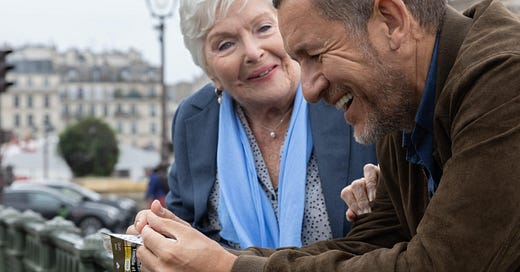Driving Madeleine
Line Renaud and Dany Boon sparkle in this tale of the unlikely friendship that unfolds on a single day when an elderly Frenchwoman bonds with her taxi driver.
I don’t know what it is about the enduring appeal of driving movies. Something about the confined spaces where the characters must sit unmoving and confront each other and themselves, while at the same time traveling from one point to another, often for some significant life journey — somebody died, moving to a new home, running away, etc.
“Driving Madeleine” doesn’t fall neatly into the category of road picture, in that it takes place over the course of a single day and the distance traveled is not great, from one end of Paris to another. But it’s a lovely little film, if a bit melodramatic at times, featuring two very different people who become the unlikeliest of friends during their short time together sharing the same path.
Line Renaud plays the title character, a 92-year-old Frenchwoman who summons a taxi to her posh home one day. (Unlike what usually happens in movies, Renaud is actually playing a bit younger than her actual age, 95, having begun her showbiz career during WWII.) By happenstance she is assigned Charles (Dany Boon) as her driver, who’s exactly half her age but is in some ways older and more beaten down by life.
Madeleine is immediately chatty, in fact demanding that Charles speak with her, even though he’s in a rather distracted place. She tells him she is leaving her home for the last time to go move into an old folks’ home at the order of her doctors, worried about heart troubles. She is very clear that she’d like to go out in style, so there will be multiple side trips, stops and excursions of the mind along the way.
A one- or two-hour drive will become an all-day affair.
Charles has much on his disordered mind. He works 12-hour days, six days a week driving his taxi, which brings him the independence he craves but not much in the way of monetary remuneration. He and his wife, Karine (Julie Delarme), have reached a point of fiscal crisis and are considering selling off their one joy, a country house she inherited from her parents.
While trading anxious phone messages with his brother, a well-to-do doctor, Charles frets that he is not being either a good provider or parental figure for his teen daughter.
Charles has become one of those guys who is essentially pissed off all of the time, and he ceaselessly shouts and quarrels with other drivers in Paris’ chaotic traffic. On top of everything else, his driving record is poor and the next time he gets a ticket, his license will be suspended and his sole income cut off.
At first he is rather put off by Madeleine and her insistence on conversing with him and making frequent stops. But as she begins to hear more of her life story, he finds himself becoming intrigued, and in turn begins to open up himself.
Played by Alice Isaaz as a younger woman, Madeleine grew up without a father to a mother who worked as a theatrical costumer. She ensorcels Charles with the tale of her first love, to an American soldier named Matt, and how they’d dance and dance. He returned to the U.S. and she never saw him again, but from this affair came her beloved son, Malthieu (played by Hadriel Roure as a boy and Thomas Alden as a young man).
Her next relationship was not so happy, to a welder named Ray (Jérémie Laheurte). Though strikingly handsome and romantic, after they marry he becomes resentful of Malthieu’s presence and their failure to have any children of their own, and things quickly turn abusive.
Director Christian Carion, who co-wrote the screenplay with Cyril Gély, photographs Matt and Ray in a gauzy, hagiograhpic way to make them seem as beautiful as possible — the sort of treatment usually reserved for women in movies. Nice to see the tables turned.
I’ll leave it to you to discover what happens in the rest of the flashback section of Madeleine’s life, other than to say it’s very different from what I saw coming. The effect it has is to make us reconsider our assessment of Madeleine as simply a headstrong, pleasant older woman.
There’s one shot I simply adore: Madeleine, thinking of her life and difficult journey, sees her younger self sitting across from her in the taxi, and they reach out to hold hands. It’s a simple but searingly empathetic way to show how she has reconciled herself to the path that brought her to this time and place.
“Driving Madeleine” is a sweet story, but also one that touches on the bitterness of life and accepting that the former is rarely unaccompanied by the latter. Madeleine has already learned this lesson, and finds a worthy pupil in Charles.
Theirs is a short, strange — but deeply affecting — trip.





